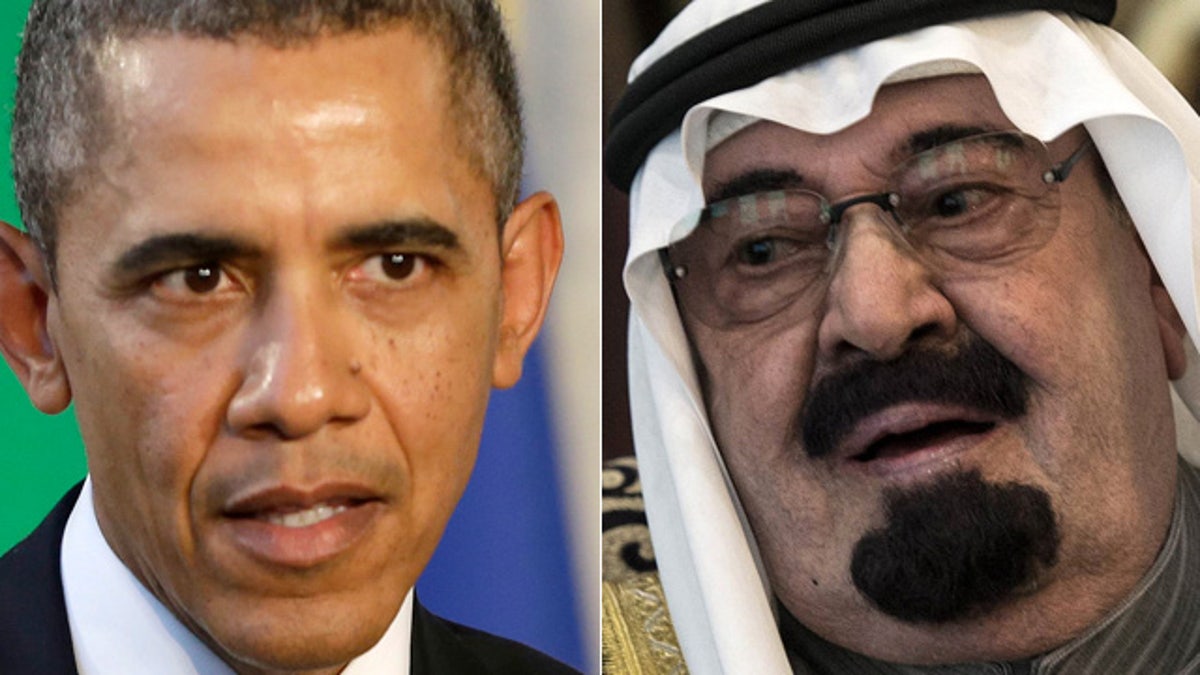
President Obama, left, and Saudi Arabia's King Abdullah. (AP)
Lawmakers on both sides of the aisle are pressing President Obama to raise the issue of human and religious rights during his face-to-face meeting Friday with Saudi Arabia’s King Abdullah.
The latest appeal came from Sen. Marco Rubio, R-Fla., who wrote Obama a letter expressing concern over Saudi Arabia’s “systematic, ongoing and egregious” infringements against what he called basic religious freedoms.
Rubio also urged the president to push for the release of religious prisoners and to “end persecution of individuals charged with apostasy, blasphemy and sorcery.”
In May 2013, Saudi religious police announced they had arrested more than 200 people during the prior year on charges of sorcery, Rubio said.
“High school textbooks in Saudi Arabia contain highly inflammatory passages that dehumanize or call for violence against non-Wahhabi religious groups such as Christians, Jews, Hindus, Shi’ites and Sufis,” the senator added.
In his letter, Rubio praised Joseph Westphal, the U.S. ambassador-designate, who told the Senate Foreign Relations Committee that he will work with Saudi authorities on human rights and religious tolerance issues. “Sustained interventions at the highest-levels of the U.S. government are required to make progress on this issue with our Saudi partners,” Rubio wrote. “I hope you can state such an engagement with the Saudi leadership during your meetings in Riyadh this week.”
The president will be navigating choppy waters during his meeting with the Saudi king on Friday. Not only will he be there to ease Saudi concerns that he has neglected the old U.S. ally but he’ll also have to keep pressure on the Middle Eastern country to address its human rights violations.
The Friday meeting marks Obama’s first trip to the oil-rich country since 2009.
On Tuesday, 52 bipartisan members of Congress and more than a dozen non-governmental organizations sent Obama their own letter asking him to confront Saudi leaders on “serious human rights violations.”
“It is time to publicly demonstrate U.S. support for those in Saudi Arabia who are willing to take such risks to advance fundamental rights in their society,” the letter stated.
Last month, Freedom House said it was “deeply concerned” by Saudi Arabia’s ratification of an anti-terrorism law that criminalizes certain actions and forms of speech.
Freedom House called on Abdullah to rescind the law, “which would otherwise lead to suppression of basic human rights, most likely falling disproportionately on women, minorities, human rights defenders and critics of the ruling family."
According to the State Department’s Country Reports on Human Rights Practices for 2013, the biggest violations include “citizens’ lack of the right and legal means to change their government; pervasive restrictions on universal rights such as freedom of expression, including on the internet, and freedom of assembly, association, movement, and religion; and a lack of equal rights for women, children, and noncitizen workers.”
The White House protested earlier this week after an American journalist, who works for the Jerusalem Post and is Jewish, was denied a visa to Saudi Arabia to cover the president. Saudi Arabia has not given an explanation.
It is considered important, though, for the U.S. to keep Saudi Arabia as an ally because of the country’s cooperation in fighting terror organizations and role serving as a counterweight to countries like Iran.
"He wouldn't be going to Saudi Arabia, he wouldn't be seeing the king, if he didn't feel the need to reassure them so that they don't go off on tangents that will in effect... not only not be productive but could be destructive," Dennis Ross, Obama's former top Middle East adviser, told Reuters.




